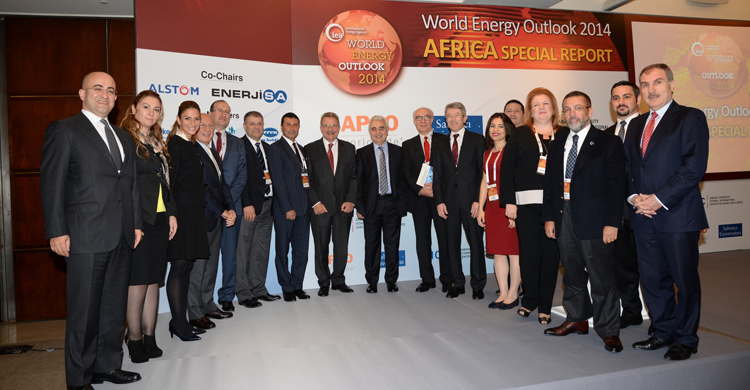23/10/2014
World Energy Outlook 2014 – The launch of the Africa Special Report, Turkey took place in Sabancı Center:
“Energy Sector is the Key to Africa's Development”

Istanbul (20 October 2014) Sabancı University International Center for Energy and Climate (IICEC) and APCO Worldwide organized the Turkey launch meeting for “World Energy Outlook 2014 - Africa Special Report” on 20 October 2014 in Sabancı Center.

The meeting started with opening remarks from APCO Worldwide’s Istanbul Office Managing Director Zeynep Dereli and Sabancı University President Prof. Dr. Nihat Berker’s and continued with International Energy Agency (IEA) Chief Economist Dr. Fatih Birol’s presentation.
Business representatives who are currently investing or planning to invest in Africa, academics and experts attended the launch meeting, which discussed in detail Africa’s energy sector, and important opportunities regarding its energy potential.
“Economic and social development in sub-Saharan Africa hinges critically on fixing the energy sector,” said IEA Chief Economist Dr. Fatih Birol. “The payoff can be huge; with each additional dollar invested in the power sector the overall economy is boosted by $15.”

Increasing access to modern forms of energy is crucial to unlocking faster economic and social development in sub Saharan Africa, according to the International Energy Agency’s (IEA) Africa Energy Outlook, a Special Report from the 2014 World Energy Outlook series. More than 620 million people in the region (two-thirds of the population) live without electricity, and nearly 730 million people rely on dangerous, inefficient forms of cooking. The use of solid biomass (mainly fuelwood and charcoal) outweighs that of all other fuels combined, and average electricity consumption per capita is not enough to power a single 50-watt light bulb continuously.
In the IEA’s first comprehensive analysis of sub-Saharan Africa, it finds that the region’s energy resources are more than sufficient to meet the needs of its population but are largely under-developed. The region accounted for almost 30 percent of global oil and gas discoveries made over the last five years, and it is already home to several major energy producers, including Nigeria, South Africa and Angola. It is also endowed with huge renewable energy resources,
including excellent and widespread solar and hydro potential, as well as wind and geothermal.
About APCO Worldwide:
Founded in 1984, APCO Worldwide is an independent global communication, stakeholder engagement and business strategy firm with offices in more than 30 major cities throughout the world. We challenge conventional thinking and inspire movements to help our clients succeed in an ever-changing world. Stakeholders are at the core of all we do. We turn the insights that come from our deep stakeholder relationships into forward-looking, creative solutions that always push the boundaries. APCO clients include large multinational companies, trade associations, governments, NGOs and educational institutions. The firm is a majority women-owned business. For more information, please visit www.apcoworldwide.com.
About Sabancı University International Center for Energy and Climate:
Working with governments, partners from industry, international organizations, think-tanks and other research bodies, establishing a network of cooperation with other universities in the region and in the world; IICEC aims to inform policy makers, industry, academics and opinion leaders on key energy challenges and provide them with objective and genuine analysis. We foster the exchange and development of ideas by providing a distinguished platform gathering key stakeholders involved in energy and climate fields.
The decision to establish the Istanbul International Centre for Energy and Climate was motivated by the growing role of Turkey in the international energy landscape and the strategic position of Istanbul, where Europe and Asia meets. The Center, at Sabancı University Karaköy Minerva Palace in Istanbul, is located at the crossroads of almost all current and emerging energy players, both on the producing and consuming sides of global energy markets. Utilizing this strategic position, IICEC will serve to fill the need for an international approach with international resources to the future of energy and climate topics, as a globally recognized networking center.




